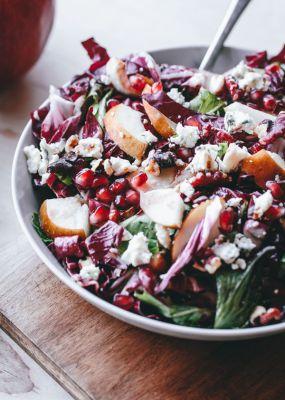It’s clear that individuals need to relearn what and how to eat well for optimum health and longevity, at a time when our well-being is of utmost importance. By listening to our bodies, eating intuitively rather than emotionally, and practicing common sense, we can relearn how to find balance in what and how we eat.
A Guide to Intuitive Eating
Our eating behaviors have been greatly impacted by diet culture and our busy lifestyles, and have further deteriorated during the global pandemic. The answer to balanced eating behaviors lies in listening to what our body wants through intuitive eating that focuses on ‘stomach hunger’ rather than ‘head hunger’ (or emotional eating).
This kind of intuitive eating also allows us to eat all kinds of foods while indulging in a moderate amount of snacks and treats from time to time without feeling guilty. Intuitive eating is also about being easier on ourselves and our relationship with food while using our learnings as points of reflection to see us along our lifelong journey to health, wellness, and happiness.
Here are a few useful techniques to help you to listen to your body as you get into the habit of eating intuitively.
1. Distinguish between ‘stomach hunger’ and ‘head hunger’
Firstly, we need to relearn how to distinguish ‘stomach hunger’ from ‘head hunger’. The latter is driven by our mouth and emotions which crave eating for the sake of pleasure, to self-soothe uncomfortable emotions or situations we may want to avoid, due to boredom, or as a form of procrastination.
When you find yourself in any of these situations, ask yourself, “Which part of my body wants the food? Is it ‘stomach hunger’ driven by the need for energy because I am hungry, or is it ‘head hunger’ that is driven by the mind and my emotions?” Sometimes it may even be thirst.
Be gentle with yourself, many of us may overindulge when we try to self-soothe by eating. By learning to identify and process these difficult emotions, we can learn how to disengage from emotional eating. It may also be helpful to explore these emotions and their triggers through journaling or in therapy.
Try to find other ways to feed these emotional cravings by doing something else or something you love. Whether it’s stepping away from your desk for a few minutes, doing a breathing exercise, calling a family member or friend, reading a book, taking a walk, or partaking in a hobby.
Keep a list of the activities that you could do instead to distract yourself from eating.
2. Practice intuitive eating by listening to your body
We need to learn how to listen to what our bodies tell us, as our bodies are always right.
Eating correctly and regularly, every 3–5 hours, encourages a rhythm that will teach you how to distinguish real hunger – it is an emptiness in the stomach that is driven by low blood sugar levels. Extreme hunger may also include headaches, shaking, dizziness, and irritable moods.
You should always eat when you feel ‘stomach hunger’ and wait for at least 10–15 minutes after finishing your meal before taking seconds. This will give the signal of fullness (satiety) time to reach your brain from your stomach, at which time you may no longer be hungry.
3. Take a balanced approach
Diets often rely on cutting out certain foods or food groups and require immense willpower, which is why they are very seldom effective. More often than not, diet culture and punitive eating plans make us feel deprived and are likely to only last a few days or weeks, ultimately leaving us feeling dejected and demotivated as the weight creeps back to where it was when we first started.
Diets that are too low in calories will damage our physiology and may cause us to bounce between one diet and the next, as we try to find the silver bullet to achieving our specific goals.
The truth is that we need to embrace a more wholesome approach to eating, by allowing ourselves to eat every single kind of food, as long as it makes up part of a balanced, portion-appropriate meal that includes all the macronutrients (carbohydrates, proteins, and fat) from various food groups.

Photo by Farhad Ibrahimzade on Unsplash
When snacks and treats are eaten mindfully and occasionally, they also serve a purpose by giving us pleasure and satiating ‘head hunger’.
4. Treat yourself occasionally
If you’re craving a treat, ask yourself, “Do I want it or do I need it?” and then decide if you’re going to eat it. We need to learn how to say both yes and no to snacks and treats an equal number of times. The key is to realize that we can’t use food to self-soothe all the time, as this can become addictive, and so we need to find other nurtures to take the place of food nurture.
When you indulge, do so in moderation by practicing portion control, once in a while and do so wholeheartedly. Take the time to savor it slowly by using all of your senses to experience what it looks like, how it smells and tastes, as well as what the texture feels like in your mouth. It’s best to do so on your own and without any distractions so that you can focus all of your attention on the experience. By doing this, you may also feel satiated much sooner than you expected – if that’s the case, try to save the rest for later or another time. You will also find that the less sugar or salt you eat, the less sugar or salt you will crave, as your taste buds adjust with time.
And when you indulge, do not allow yourself to feel any guilt. We also need to learn how to untangle our thinking and vocabulary around the perceptions that certain foods are bad for us or naughty. We need to stop thinking that we have cheated if we ate something delicious for the sake of taste rather than nutrition. Every kind of food can play a part in our life when we eat mindfully.
5. It’s a lifelong journey
Changing habits is a challenging and time-consuming process because they are so ingrained in our lifestyles. This is an ongoing commitment that we need to make daily. If you do happen to overindulge, see it as a learning experience for the future. If you do happen to overindulge, it doesn’t negate all the hard work you’ve done until that point – it doesn’t take you back to square one.
Remember that the road towards health and wellness is not linear and that there is no such thing as perfection – this is merely a construct of popular culture. Instead, focus on the positive changes and progress you have made so far. Once you manage to get your eating pattern right by listening to your body, your physiology will also improve, which allows you the space to work on the emotional aspects of understanding why you eat to self-soothe. This is a lifelong journey to health, wellness, and better self-care.





![women [longevity live]](https://longevitylive.com/wp-content/uploads/2020/01/photo-of-women-walking-down-the-street-1116984-100x100.jpg)









